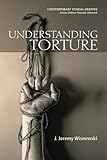Understanding Torture / J. Jeremy Wisnewski.
Material type: TextSeries: Contemporary Ethical Debates : CEDPublisher: Edinburgh : Edinburgh University Press, [2022]Copyright date: ©2010Description: 1 online resource (288 p.)Content type:
TextSeries: Contemporary Ethical Debates : CEDPublisher: Edinburgh : Edinburgh University Press, [2022]Copyright date: ©2010Description: 1 online resource (288 p.)Content type: - 9780748635375
- 9780748643301
- HV8593 .W57 2010eb
- online - DeGruyter
| Item type | Current library | Call number | URL | Status | Notes | Barcode | |
|---|---|---|---|---|---|---|---|
 eBook
eBook
|
Biblioteca "Angelicum" Pont. Univ. S.Tommaso d'Aquino Nuvola online | online - DeGruyter (Browse shelf(Opens below)) | Online access | Not for loan (Accesso limitato) | Accesso per gli utenti autorizzati / Access for authorized users | (dgr)9780748643301 |
Frontmatter -- Contents -- Series Preface -- Acknowledgments -- Chapter 1 The Persistence of Torture: An Affliction That Won’t Go Away -- Chapter 2 The History of Torture: A Sketch -- Chapter 3 The Wrongness of Torture: Identifying Torture’s Unique Despicability -- Chapter 4 How Torture Unmakes Worlds -- Chapter 5 Thinking through Torture’s Temptations Part One: Arguments For Torture -- Chapter 6 Thinking through Torture’s Temptations Part Two: Arguments Against Torture -- Chapter 7 The Psychology of Torture -- Chapter 8 The Politics of Torture: Orwellian Themes in the Bush League -- Chapter 9 Hope Amid Pessimism: Concluding Reflections on Ending Torture -- Selected Bibliography -- Selected Useful Websites -- Index
restricted access online access with authorization star
http://purl.org/coar/access_right/c_16ec
Despite Victor Hugo's 19th-century proclamation that torture no longer exists, we still find it even now, even in those nations that claim to be paradigms of civility. Why is it that torture still exists in a world where it is routinely regarded as immoral? Is it possible to eliminate torture, and if so, how? What exactly does it mean to call something 'torture', and is it always morally reprehensible?Arguments in favour of torture abound, but in this important new book, J. Jeremy Wisnewski examines and explains the moral dimensions of this perennial practice, paying careful attention to what lessons torture can teach us about our own moral psychology. By systematically exposing the weaknesses of the dominant arguments for torture, drawing on resources in both analytic and continental philosophy and relevant empirical literature in psychology, Wisnewski aims to provide an over-arching account of torture: what it is, why it's wrong, and why even the most civilized people can nevertheless engage in it.
Mode of access: Internet via World Wide Web.
In English.
Description based on online resource; title from PDF title page (publisher's Web site, viewed 29. Jun 2022)


